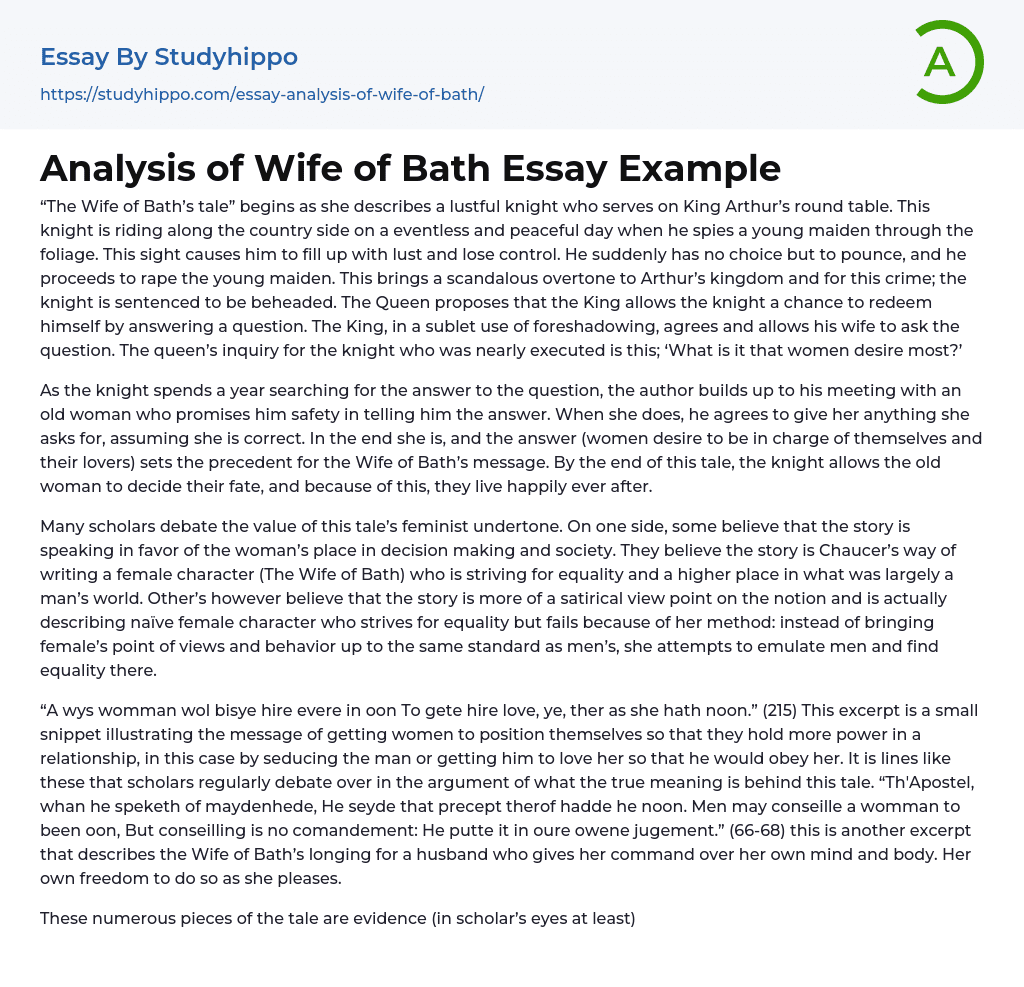“The Wife of Bath’s tale” begins as she describes a lustful knight who serves on King Arthur’s round table. This knight is riding along the country side on a eventless and peaceful day when he spies a young maiden through the foliage. This sight causes him to fill up with lust and lose control. He suddenly has no choice but to pounce, and he proceeds to rape the young maiden. This brings a scandalous overtone to Arthur’s kingdom and for this crime; the knight is sentenced to be beheaded. The Queen proposes that the King allows the knight a chance to redeem himself by answering a question. The King, in a sublet use of foreshadowing, agrees and allows his wife to ask the question. The queen’s inquiry for the knight who was nearly executed is this; �
...�What is it that women desire most?’
As the knight spends a year searching for the answer to the question, the author builds up to his meeting with an old woman who promises him safety in telling him the answer. When she does, he agrees to give her anything she asks for, assuming she is correct. In the end she is, and the answer (women desire to be in charge of themselves and their lovers) sets the precedent for the Wife of Bath’s message. By the end of this tale, the knight allows the old woman to decide their fate, and because of this, they live happily ever after.
Many scholars debate the value of this tale’s feminist undertone. On one side, some believe that the story is speaking in favor of the woman’s plac
in decision making and society. They believe the story is Chaucer’s way of writing a female character (The Wife of Bath) who is striving for equality and a higher place in what was largely a man’s world. Other’s however believe that the story is more of a satirical view point on the notion and is actually describing naïve female character who strives for equality but fails because of her method: instead of bringing female’s point of views and behavior up to the same standard as men’s, she attempts to emulate men and find equality there.
“A wys womman wol bisye hire evere in oon To gete hire love, ye, ther as she hath noon.” (215) This excerpt is a small snippet illustrating the message of getting women to position themselves so that they hold more power in a relationship, in this case by seducing the man or getting him to love her so that he would obey her. It is lines like these that scholars regularly debate over in the argument of what the true meaning is behind this tale. “Th'Apostel, whan he speketh of maydenhede, He seyde that precept therof hadde he noon. Men may conseille a womman to been oon, But conseilling is no comandement: He putte it in oure owene jugement.” (66-68) this is another excerpt that describes the Wife of Bath’s longing for a husband who gives her command over her own mind and body. Her own freedom to do so as she pleases.
These numerous pieces of the tale are evidence (in scholar’s eyes at least) that Chaucer was providing this story as a commentary on the woman
who wanted her status elevated or the woman who seeks social equality from men. One half of scholars believe he was undermining this notion and displaying why it would never work, while the other half believe he was displaying the lesson that women truly do deserve to be listened to and deserve a man that allows her freedoms over herself.
I believe that the story is an interesting one that has no commentary on the subject on hand. Many critics and scholars spend hours upon hours dissecting classic works and the message they convey. I believe that often times, there is a message or political undertone in these stories, but I believe in this case, Chaucer was simply entertaining, telling a story. This would not cause the story to lose any value, as stories are primarily vehicles for entertainment to the audience. This is a cleverly written story of a knight who learns to allow his woman to be in charge of herself and is rewarded for it. This could carry significance if Chaucer’s other tales didn’t have content that contradicted this seemingly heartfelt message. I believe The Tale of the Wife of Bath is a well written story and is significant enough for this alone. ABC order. Ctrl Enter for hard page.
- Book Summary essays
- Metaphor essays
- Reader essays
- Rhyme essays
- Literary devices essays
- Villain essays
- Books essays
- Genre essays
- Literary Criticism essays
- Writer essays
- Protagonist essays
- Simile essays
- Poem essays
- Book Report essays
- Book Review essays
- Greek Mythology essays
- Plot essays
- Tragic Hero essays
- Coming of Age essays
- Play essays
- Rhetoric essays
- Rhetorical Question essays
- Translation essays
- Understanding essays
- Reason essays
- Character essays
- Letter essays
- American Literature essays
- Literature Review essays
- Utopia essays
- Poetry Analysis essays
- Dante's Inferno essays
- Between The World and Me essays
- Incidents in The Life of a Slave Girl essays
- Flowers for Algernon essays
- Myth essays
- Everyday Use essays
- Boo Radley essays
- Genesis essays
- Richard iii essays
- Alice in Wonderland essays
- On the road essays
- Ozymandias essays
- The Nightingale essays
- Holden Caulfield essays
- Animal Farm essays
- 1984 essays
- A Hanging essays
- Shooting An Elephant essays
- A Tale Of Two Cities essays




